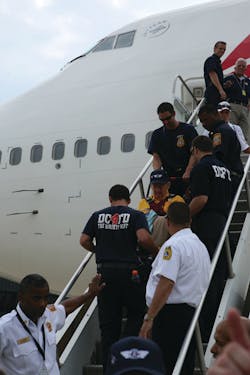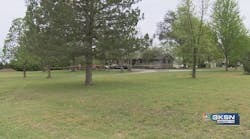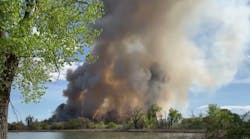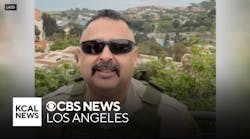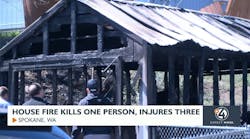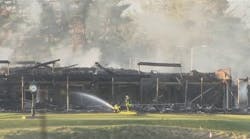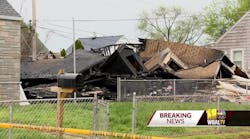Fire departments working together surprise no one. In fact, mutual aid is a common occurrence in many communities across the country. More often than not, the fire service is willing to help when asked. Sometimes, the event may not even be an emergency.
Such was the case in August 2010, when Central Iowa Honor Flight made two trips to Washington, DC, to visit the World War II Memorial. The District of Columbia Fire Department (DCFD), Metropolitan Washington Airports Authority Fire Department, Fairfax County, VA, Fire and Rescue Department and other area agencies provided much-needed assistance in making the trip a special occasion for about 700 World War II veterans hailing from the "Fields of Opportunity State."
Honor Flight
Honor Flight is a national initiative to get America's World War II veterans to Washington, DC, to see their monument, the National World War II Memorial. This mission takes on a sense of urgency when one considers that nationwide we are losing about 900 of the "greatest generation" folks every day. Assisting these veterans as they make the Honor Flights is a worthy cause. I am still in awe of the tremendous odds our veterans faced as they landed on those beaches, facing death and destruction, as they pressed on and ultimately defeated our enemies. It was not without a tremendous cost to these brave men and women. Lives were lost, scarred and forever changed. Young men and women paid the ultimate price for America's freedom for the good of our country and in the name of countries half a world away.
Honor Flights are a free service for our nation's veterans. The cost of the flights is covered through donations and the help is provided by volunteers. Volunteers are needed to assist the veterans through airport security as well as climbing two flights of stairs as they board the Boeing 747 jetliner. Additionally, volunteers were needed to travel with the veterans to help them when they deplaned in Washington, DC, and as they traveled around the city visiting the memorials.
The fire service stepped up to fill the need for a support team — a task complicated by the fact that these veterans are elderly, many of them need assistance in walking and a few dozen were confined to wheelchairs. On the first of two Central Iowa Honor Flights of 350 veterans, the youngest veteran was 84 and the oldest was 100 years old. Assistance was needed for the early-morning departure and again when they returned to Des Moines late that same day.
The Journey Begins
An Honor Fight is highly coordinated and requires a great deal of logistics and preparation. To avoid the inevitable difficulties of trying to get 700 veterans and 100 volunteers to meet at the airport for a 6 A.M. flight, the veterans were registered the day before the flight and most stayed at a hotel at Des Moines International Airport. At registration, each veteran was assigned to a color-coded group that matched one of the 11 buses they were assigned to throughout the trip. This made tracking the veterans during this trip much easier. Also, each veteran was provided a "WWII Veteran" hat and an "Honor Flight" shirt, making them easily identifiable even at a distance.
Part of the trip was a pre-flight meal the night before the trip. The veterans were bused to a convention center and enjoyed a meal with a special show. There was great military music and photographs from the World War II era as well as displays of World War II military gear and uniforms. The Iowa troops moved out to the pre-flight meal in a bus caravan with a police escort and a motorcycle escort by Legion Riders and Freedom Riders, all equipped with American flags. Local citizens lined the route and their "salute" to the veterans touched them deeply. I overheard one veteran state that he hadn't received this kind of welcome when he returned from the war — the brave man was moved to tears as the U.S. flags were waved and the masses cheered the veterans.
There were 150 local fire and police personnel, nurses, dispatchers and other public safety people who assisted with the flights known as the "Honors Ground Crew." Helpers were divided into morning and night platoons. The morning volunteers were to report at 2:30 A.M., as they had to clear security before they were allowed to assist the veterans at the airport security checkpoint. The early-morning shift was scheduled to be completed around 6:30 as the planned trip had "wheels up" by that time. Many of the early-morning volunteers were signed up to help with the night shift. The night shift was scheduled to begin at 9:30 P.M. and planned on wrapping up around midnight.
On Their Way To Washington
The day started very early and following morning revelry, the veterans enjoyed an early breakfast and screening at 3 A.M. It took several hours to get the 350 veterans and all the volunteers through the Transportation Security Administration (TSA) screening process and boarded on the buses for the trip to the airport. All 11 buses were loaded and caravanned directly to the tarmac, passing several hundred flag-waving supporters along the way, which was especially impressive at 5:30 A.M. The veterans were touched by the outpouring of support so early in the morning.
About 50 volunteers made the trip with the war veterans, but additional help was required once the group arrived in DC to assist with the many wheelchairs and walkers needed by the vets. These volunteers included firefighter/medics, doctors, nurses and corporate sponsors whose companies had funded the trip. The veterans were welcomed to DC by the Metropolitan Washington Airports Authority Fire Department's crash-fire-rescue (CFR) trucks providing a "water salute" as the jumbo jet taxied to the disembarking area. The Central Iowa Honor Flight-DC Chapter volunteers were in place and ready to assist in Washington.
Once the veterans were off-loaded, the DCFD firefighters accompanied them as they toured the city's iconic monuments. On these trips, the "Washington Ground Crew" was made up of members of the DCFD who volunteered for this most honorable duty. This is where Iowa's fire service called on mutual aid from DCFD. Iowa State Fire Marshal Ray Reynolds had met DCFD Fire Marshal Bruce Faust at a national fire prevention conference. Reynolds had served as an Honor Flight volunteer on previous flights and used this networking opportunity to ask the DCFD for assistance. Faust took the project to DCFD Fire Chief Dennis L. Rubin, who rolled out the "red carpet" for the Iowa veterans.
As the doors to the Boeing 747 opened, the veterans were welcomed by dozens of DCFD personnel. Rubin was near the top of the jet way steps to greet the veterans as they arrived. DCFD staff assisted in the deplaning process for the veterans. Once aboard the buses, the veterans were provided with a police escort from the Metropolitan Police Department (DC's police department); Arlington, VA, Police Department; U.S. Park Police, U.S. Secret Service Uniform Division Police and Metropolitan Washington Airports Authority Police Department to the World War II Memorial. DCFD Marine Division Fire Boat 1 provided a water display as the veterans crossed the Memorial Bridge over the Potomac River into the district. The hospitality did not stop there.
Long-Awaited Visit
While touring the monuments, the DCFD personnel were on hand, staffing ambulances at each stop to once again help the veterans as they made their way on and off the buses and toured the memorials. DCFD personnel went above and beyond to make the trip comfortable and make the veterans feel welcome and appreciated as they toured.
Nothing could have illustrated the value of having DCFD assisting on this trip more than having them there when the program didn't go as planned. The weather was especially hot and at least two of the veterans were transported to local hospitals for medical emergencies. While this might not seem unusual for this age group, it was critical that the veterans be back with the group and ready to make the return flight later that day. If the veterans were not able to make the return trip with the group, there would be a tremendous added expense in flying them home on a later flight as well as issues of not having needed medications and worried families back in Iowa. DCFD made sure that the veterans were back with the group and ready for the trip home.
The next example of the tremendous support that brother and sister DC firefighters would provide was just a few hours away. The next challenge was with a meal miscue, resulting in all of the 400 prepared lunches being placed on the buses too early in 90-plus-degree weather for more than three hours, causing them to spoil. The decision was made to not chance the lunches. DCFD Lieutenant Sean Egan sprang into action and with the help of numerous people, he managed to have more than 400 fresh meals prepared and delivered to the hungry veterans within 90 minutes.
One of the many touching moments occurred when one of the World War II veterans asked to make a personal visit to Arlington National Cemetery. The tour buses could go to the main entrance, but not inside the facility. There was no ability built into the program for the buses to spend more than 30 minutes on this hallowed soil. So, with the help of Egan and his staff, a DCFD ambulance was called and the Iowa veteran soon was underway to the Administration Office at Arlington to locate the grave of his son, who was killed in action in the Vietnam War. There wasn't a dry eye in the special assigned ambulance when the old soldier told the story of losing his son at war and with an ear-to-ear smile, he told the crew of his appreciation for being allowed to visit his son's grave for the last time during his life.
The Journey Ends
As night began to fall over the World War II Memorial, the veterans started the journey home. The veterans knew they are beloved and admired and held in high esteem by this nation's firefighters. If ever there were a labor of love and respect that the Iowa fire service and DCFD were involved in, this was certainly one of those wonderful experiences that have left an impression for a lifetime.
After about 48 hours of near-military precision, the brave men and women were glad to be seated and belted on the aircraft headed home. Memories were made and friendships forged forever.
JERRY HOLT, CFO, EFO, MA, is the fire chief for the Urbandale, IA, Fire Department. He is a graduate of the National Fire Academy's Executive Fire Officer Program and holds associates' degrees in fire science and EMS and a master's degree in leadership.
